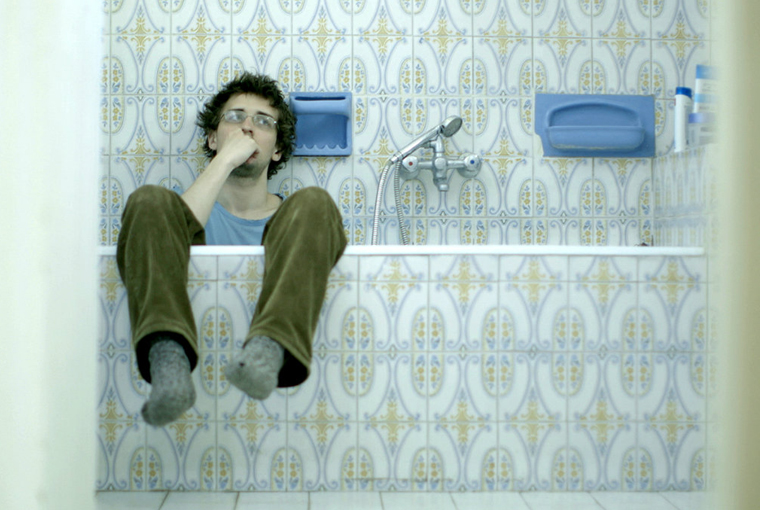A Hipster in Budapest
Gabor Reisz’s For Some Inexplicable Reason (VAN valami furcsa és megmagyarázhatatlan, 2014)
Vol. 54 (June 2015) by Colette de Castro
For Some Inexplicable Reason, the debut feature of Gabor Reisz, follows Aron, a young cinema-studies graduate, from the Hungarian capital to Lisbon and back. He is unemployed, misunderstood and can’t get a girlfriend. Although his parents adore him, they warn him that his trip, like his life, seems to be taking him nowhere. At 29, he has just finished his studies and is starting to worry about his future.
It is said that fictional heroes should be either Don Juans or Don Quixotes, but Aron finds himself in the no-man’s-land between the two. A hopeless romantic, his girlfriend has left him, and he relentlessly pursues a female ticket collector he meets in the tram – an unsuccessful mission. Then he meets a girl in Lisbon with whom he falls in love, but soon he goes home again. The mal du siècle or world-weariness of this generation is portrayed as being only added to by an easy access to information and travel – even his trip to Lisbon doesn’t allow him to escape Facebook photos of his ex-girlfriend.
The film portrays what it is to be over-educated, young and ‘unsuccessful’ in an European capital. When Gabor’s mother throws away his favorite t-shirt which he had prepared for his trip to Lisbon, replacing it with shiny shirts in packages, he shouts at her that he would rather look like a tramp than like a businessman. Some might classify him as a ‘hipster’, an overqualified, posh youngster who has friends but neither employment nor perspective and thus calls into question how we should classify success. Is it about being popular, having a career, or even being of a certain political affiliation?
When Aron is at the unemployment office, he is received by a career counselor who inquires about his studies and then asks unemotionally – while typing away at the computer – “and what kind of films are you interested in?” We see a closeup on Aron’s face as he frowns for a few seconds in intense concentration before suddenly starting to speak enthusiastically just as the counselor interrupts him to ask another question, going on to suggest that he do data entry in a multinational corporation. Aron walks out in the middle of the conversation, and we see the counselor continuing to explain the job offer to an empty chair, not noticing that his interlocutor has left.
Further surreal scenes ensue, like when the hero imagines all the different ways he might die when we see him keeling over in a variety of unlikely places, or when he follows an unplugged cable from his parents house into his own flat down the road, as if it were some kind of umbilical cord. This kind of situational gag is common in the film. In terms of genre, it is reminiscent of certain American television series: Flight of the Concords, Looking, or Girls. Produced by the TV giant HBO, they all seem to be following a new trend for a special kind of kooky humor, where the protagonists are awkward but cool, don’t know where they are going in life while simultaneously living their lives to the fullest.
To some extent, these shows are spin-offs of first generation television series from the 80s such as Seinfeld or Friends, which were based on the premise that the show doesn’t have to be about anything in particular – just people talking about life. But while in Friends the characters have obvious aspirations – romantic, to be in a couple, and financial, to get serious jobs -, it seems like today’s characters goals are less clear-cut. In the season finale of Broad City, another successful comedy series airing on Comedy Central, the main character tells her best friend that her goals for the year were merely to “learn how to squirt” and to “visit a pug farm”. In today’s television series, the character’s goals revolve around experience rather than outcome. Thus when Arons’ friends, after an evening drinking vodka with Brazilian girls, burst into song and dance, the television series-adept viewer is hardly surprised. Whether they live in Berlin, Bucharest or Budapest, protagonists depicting this lost generation are now breaking away from TV into the world of cinema.




Leave a Comment